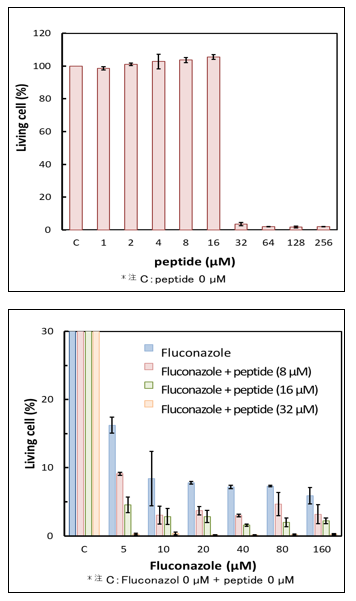Advantages
- A Novel Approach to Antimicrobial Resistance (AMR): By inducing apoptosis in fungi, this peptide offers a new mechanism of action distinct from existing drugs, which can suppress the emergence of resistant strains. A synergistic effect is also expected when used in combination with existing drugs.
- Efficacy Against a Wide Range of Fungal Species: Its effectiveness has been confirmed against phylogenetically distant fungal species such as Candida and budding yeast, indicating potential applications for various fungal infections.
- High Production Efficiency and Lower Cost: Compared to existing defensin-based peptides, it has fewer amino acids, making chemical synthesis easier and more efficient, which is advantageous in terms of manufacturing costs.
Technology Overview & Background
Mycoses, particularly superficial fungal infections like athlete’s foot, affect a large portion of the population and significantly impact patients’ quality of life. Existing antifungal drugs primarily work by inhibiting the synthesis of ergosterol, a key component of the fungal cell membrane. However, this lack of diversity in the mechanism of action has led to the serious problem of emerging drug-resistant strains.
To address this, plant-derived defensins are gaining attention for their antifungal activity through novel mechanisms. For example, the rice-derived defensin OsAFP1 exhibits its antifungal effect by potently inducing apoptosis in fungi, offering a different approach from conventional drugs. However, OsAFP1 (49 amino acids) and other plant defensins like Pezadeftide (51 amino acids) are long-chain peptides, which poses a challenge due to low production efficiency.
The inventor successfully identified the active partial sequence of OsAFP1 and created novel short-chain antifungal peptides, reducing the length to 7-13 amino acids while maintaining potent antifungal activity. This significantly improves production efficiency compared to the original long-chain peptides. These short-chain peptides retain the same mechanism of action as OsAFP1—inducing apoptosis in fungi—and are expected to be effective against a wide range of fungi, including Candida species and budding yeast. Furthermore, a high synergistic antifungal effect has been confirmed when used in combination with conventional azole antifungal drugs, which is also believed to contribute to suppressing the development of resistant strains. This technology, combining a novel mechanism of action with high production efficiency, is a promising candidate for a next-generation antifungal drug.
Data
- A short-chain peptide derived from the rice defensin OsAFP1 inhibited the growth of Candida albicans strain CAI4 by over 95% at a concentration of 32 µM. A modified version of this peptide demonstrated even higher antifungal activity at 16 µM (top figure).
- When used in combination with the conventional antifungal drug fluconazole, the short-chain peptide showed a synergistic effect, significantly reducing the viable cell count of
- Candida albicans strain CAI4 compared to when either agent was used alone (bottom figure).
 |
Publication
A. Ochiai. et al., Scientific Reports, 8, 11434, 2018.
[DOI]: https://doi.org/10.1038/s41598-018-29715-w
Patent
Patent pending (unpublished)
Principal Investigator & Academic Institution
Dr. Akihito Ochiai (Niigata University)
Expectations
We are seeking collaborative research or licensing agreements with pharmaceutical and biotech companies interested in developing novel antifungal drugs based on this defensin short-chain peptide. We also welcome partnerships with companies in the agricultural sector, where potential applications are anticipated. Disclosure of unpublished data is possible upon the execution of a non-disclosure agreement with Niigata University, and direct meetings with the researchers can be arranged. A paid Material Transfer Agreement (MTA) is available for evaluation studies of this peptide.
Project ID:WL-05288


